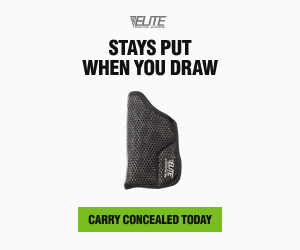A legal analysis by attorneys at Texas Law Shield and U.S. Law Shield finds that filmmaker Stephanie Soechtig, members of Soechtig’s staff, and executive producer Katie Couric likely did not violate state and federal firearms-transaction laws during production of a recent anti-gun film — contrary to assertions by some pro-gun groups.

Michele Byington, attorney at the law firm of Walker & Byington and a Texas Law Shield Independent Program Attorney, said, “There’s been a lot of buzz about Katie Couric’s documentary Under the Gun. Some of the buzz is praise by the anti-gun crowd, who are happy to have another biased piece of media to reinforce their pre-existing beliefs.”
Byington said, “The rest of the buzzing is the hornet’s nest Katie Couric’s team kicked using editing tricks in a vain attempt to make responsible gun owners look under-informed. That’s being resolved in the court of public opinion.”
What interested Byington and her colleagues were allegations that Under the Gun staff members may have conducted illegal purchases of firearms to further their narrative.
“The question is, did anyone on that team actually do anything legally wrong?” Byington asked.
Byington said the documentary shows one individual purchasing guns from other individuals; they do this to illustrate how easy it is to obtain firearms. But then Under the Gun’s director Soechtig gave an interview to TheLipTV that raised four major issues:
- That members of her staff may have purchased firearms across state lines;
- That members of her staff may have purchased a firearm for someone else, at someone else’s direction;
- What a “conspiracy” is under federal law;
- And the consequences the producer’s actions could have on the sellers.
At about 1:35 into the TheLipTV video interview, Byington said Soechtig’s lack of gun-transaction knowledge adds a whole different dimension to the entire scenario. Byington said, “The interview states that one of the producer’s employees, who resides in Colorado, had to go to Arizona to purchase the firearms. You may be wondering why they had to leave Colorado to buy these guns for the documentary.”
Byington added, “That’s because Colorado has a universal background check law in place. What their efforts really show are how if someone is determined, they will break the law to get what they want.” Based on the information that’s available in the media, she went further to break down the possible legal violations:
Purchasing a Firearm Across State Lines
Byington explained that the law is strict in regards to purchasing handguns or long guns outside of an individual’s state of residence.
“Long guns can be purchased from a licensed dealer, as long as both your state of residence and state of purchase have no laws prohibiting your purchase,” she said. Handguns, however, cannot be purchased in another state, either privately or from a licensed dealer, and be brought back into your state of residence.
In the TheLipTV interview, Soechtig stated that they purchased a Bushmaster and three handguns from private individuals, Byington said. (Byington also noted that the Soechtig and interviewer both incorrectly referred to the Bushmaster as an “assault weapon.”)
Byington said that while the Under the Gun staff seemingly did purchase the firearms out of their resident state, it only becomes a crime if they take the firearms back to their resident state.
“As dumb as it sounds, they can buy the gun in one state, so long as they don’t take it home, they haven’t committed a crime,” Byington said.
So, the question is, did the Under the Gun staff take the guns to their home state of Colorado?
“It would appear not,” Byington said. The producer, in another interview, stated that the firearms were immediately turned over to Arizona law enforcement officers for use or destruction. “So, no crimes were committed so far,” Byington said.
Straw Purchase
Byington said straw purchases are defined in 18 U.S.C. § 922(a)(6); this applies whenever you purchase a gun for someone else from a licensed dealer. Byington said, “Because they purchased from individuals, this doesn’t apply at all. So no crime here either.”
Conspiracy
“18 U.S. Code Section 371 defines the crime of conspiracy,” Byington said. Byington added that the elements of the crime of conspiracy are simply, 1) Two people conspire to commit a federal offense; and 2) One or more of the conspirators do something to effect that crime.
For allegations of this crime to get traction, the question boils down to, what was their initial plan? Byington explained that, “If the plan was to take the guns back to Colorado, then they were planning to commit a crime, and that would satisfy the elements for conspiracy. But if the plan all along was to turn it over to Arizona law enforcement, they were not planning a crime, and conspiracy wouldn’t stick either.”
The Sellers
Byington also pointed out that in their dishonest quest to purchase firearms, innocent individuals may have been caught in the producer’s wake.
“The worst part is, the producers did not even consider that they had implicated the sellers of the firearms,” Byington said. “Soechtig and members of her staff went out of their way to engineer the perfect situation for the documentary while guaranteeing their own legal safety, but put innocent gun owners at risk.”
It is illegal to knowingly sell a firearm to an individual from another state without going through a licensed firearm dealer, even if they don’t take it back to their resident state.
“So if the producers said, ‘Hey, we’re from Colorado doing a documentary, can you sell us these guns?’, they tricked the sellers into committing federal offenses. If they didn’t say anything at all, then the sellers are legally safe.”
Byington said that, assuming the producer and documentary team — who have continuously lied and misrepresented facts to push their agenda already — are telling the truth about what they did with the guns after their purchase, then they didn’t commit a crime.
Byington said, “In making this documentary, which was trying to illustrate why we need more laws that make it harder to buy guns, the team almost broke existing laws that were supposed to regulate gun purchasing. That is too ironic to miss.”







